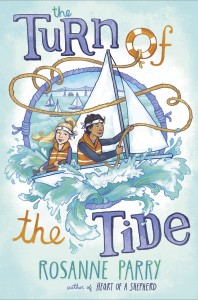As high concepts and beat sheets play a larger role in young adult fiction, middle grade has increasingly become the home of the quiet, character-driven novel. While less of a thrill ride, these novels offer young readers a character with whom they can identify and situations that show they are not alone in facing the challenges of growing up. Ali Benjamin’s The Truth About Jellyfish was a 2015 standout example of this kind of novel, and its fans, and many others, will appreciate Rosanne Parry’s newest release, Turn of the Tide (Random House, 2016).
 Turn of the Tide begins with a devastating earthquake and tsunami in Japan, which also led to the meltdown of the nearby nuclear reactor. Thirteen-year-old Kai, whose Japanese mother and Swedish-American father both work at the reactor, barely survives the disaster that claims the life of his beloved grandparents. Failing to save them weighs heavily on him, as does his parents’ decision to send him to his aunt and uncle in the seacoast town of Astoria, Oregon. In leaving, he will be unable to join his schoolmates in the rebuilding effort. He will be seen as a shirker, and even more of an outsider.
Turn of the Tide begins with a devastating earthquake and tsunami in Japan, which also led to the meltdown of the nearby nuclear reactor. Thirteen-year-old Kai, whose Japanese mother and Swedish-American father both work at the reactor, barely survives the disaster that claims the life of his beloved grandparents. Failing to save them weighs heavily on him, as does his parents’ decision to send him to his aunt and uncle in the seacoast town of Astoria, Oregon. In leaving, he will be unable to join his schoolmates in the rebuilding effort. He will be seen as a shirker, and even more of an outsider.
His cousin Jet has problems of her own. Her two best girl friends have become boy crazy, and one of them is “going out” with school bully Roland, who has turned her oldest childhood friend, Beck, against her. Jet (short for Bridget) wants to be a ship pilot, but in sailing with her younger brother, she forgets to check the tide and ends up running her family’s sailboat aground. When Kai arrives, Jet realizes his problems are much bigger than hers, but that doesn’t mean they don’t matter to her.
As Kai adjusts to life in America, both he and Jet encounter cultural differences and emotional landmines. He worries about his parents and grieves for his grandparents and his town. Jet dreams of the big regatta where she will finally show Beck and Roland, her father, and the other male captains that being a girl makes her no less worthy of following in her father, grandfather, and great-grandfather’s footsteps. And in a place of unpredictable weather and tides and heavy shipping traffic, danger lurks.
Parry narrates the story in third person through Kai and Jet’s alternating points of view, and readers see the same events from different perspectives. The language is rich and vivid, and Parry provides a glossary of nautical terms; a message from Captain Deborah Dempsey, the first female Columbia River Bar Pilot; and an overview of the 2011 natural disaster on which this story is based. Rooted in the coastal communities of the Pacific Northwest, Turn of the Tide presents a way of life as experienced by an insider and an outsider. Readers come to see what Kai has lost and why this summer is important to him even if he isn’t able to help with the rebuilding. While challenges await him upon his return, both he and his cousin find sources of strength, pride, and accomplishment as they get to know each other and work together through a crisis.